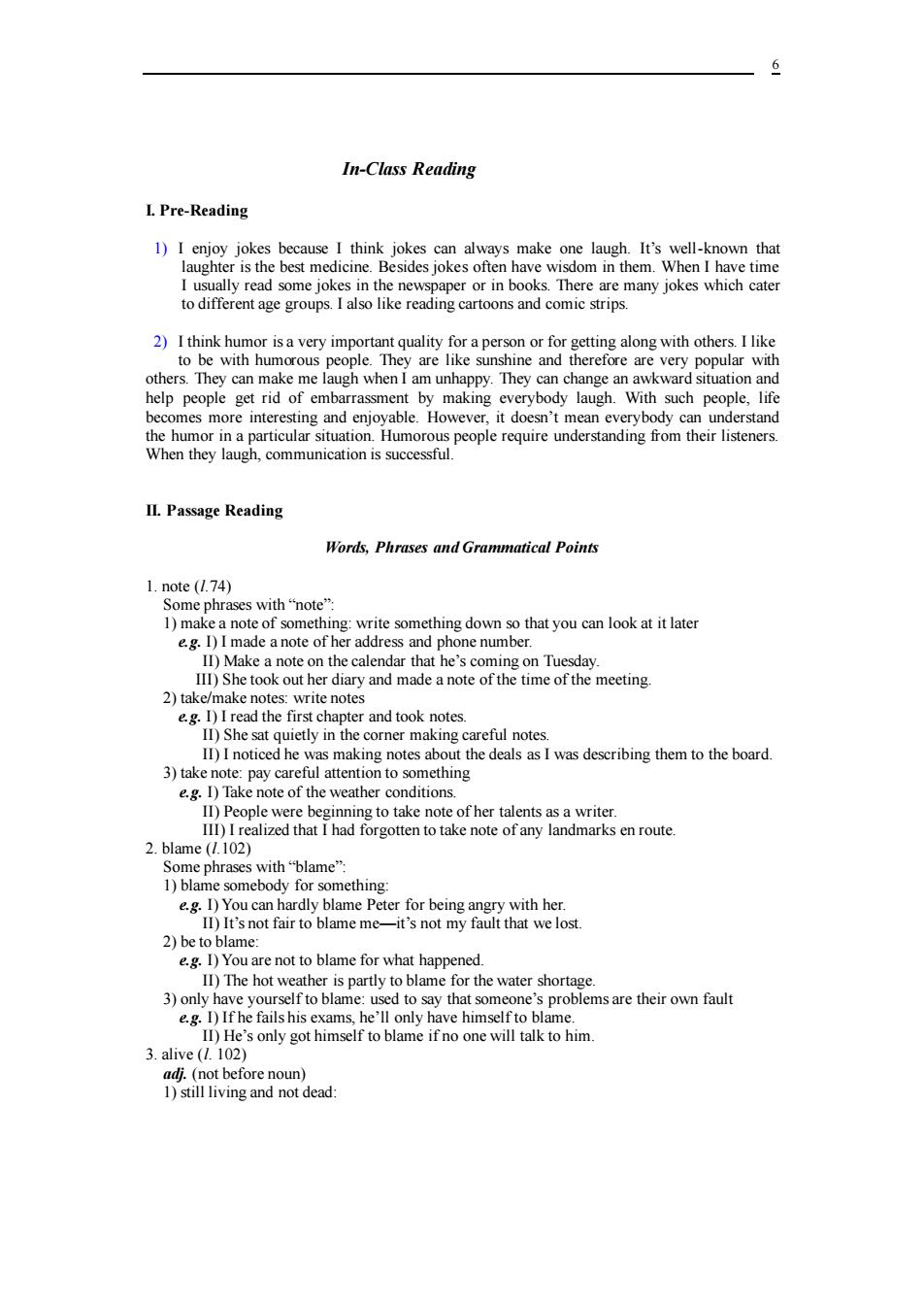正在加载图片...

6 In-Class Reading I.Pre-Reading 1)I enjoy jokes because I think jokes can always make one laugh.It's well-known that laughter is the best medicine.Besides jokes often have wisdom in them.When I have time I usually read some jokes in the newspaper or in books.There are many jokes which cater to different age groups.I also like reading cartoons and comic strips. 2)I think humor is a very important quality for a person or for getting along with others.I like to be with humorous people.They are like sunshine and therefore are very popular with others.They can make me laugh when I am unhappy.They can change an awkward situation and help people get rid of embarrassment by making everybody laugh.With such people,life becomes more interesting and enjoyable.However,it doesn't mean everybody can understand the humor in a particular situation.Humorous people require understanding from their listeners. When they laugh,communication is successful. II.Passage Reading Words,Phrases and Grammatical Points 1.note (1.74) Some phrases with"note": 1)make a note of something:write something down so that you can look at it later eg.I)I made a note of her address and phone number. Il)Make a note on the calendar that he's coming on Tuesday III)She took out her diary and made a note of the time of the meeting. 2)take/make notes:write notes eg.I)I read the first chapter and took notes. II)She sat quietly in the corner making careful notes. II)I noticed he was making notes about the deals as I was describing them to the board. 3)take note:pay careful attention to something e.g.I)Take note of the weather conditions. 11)People were beginning to take note of her talents as a writer. III)I realized that I had forgotten to take note of any landmarks en route. 2.blame(1.102) Some phrases with"blame": 1)blame somebody for something: e.g.I)You can hardly blame Peter for being angry with her. II)It's not fair to blame me-it's not my fault that we lost. 2)be to blame: e.g.I)You are not to blame for what happened. II)The hot weather is partly to blame for the water shortage. 3)only have yourself to blame:used to say that someone's problems are their own fault e.g.I)If he fails his exams,he'll only have himself to blame. II)He's only got himself to blame if no one will talk to him. 3.alive (7.102) adj.(not before noun) 1)still living and not dead:6 In-Class Reading I. Pre-Reading 1) I enjoy jokes because I think jokes can always make one laugh. It’s well-known that laughter is the best medicine. Besides jokes often have wisdom in them. When I have time I usually read some jokes in the newspaper or in books. There are many jokes which cater to different age groups. I also like reading cartoons and comic strips. 2) I think humor is a very important quality for a person or for getting along with others. I like to be with humorous people. They are like sunshine and therefore are very popular with others. They can make me laugh when I am unhappy. They can change an awkward situation and help people get rid of embarrassment by making everybody laugh. With such people, life becomes more interesting and enjoyable. However, it doesn’t mean everybody can understand the humor in a particular situation. Humorous people require understanding from their listeners. When they laugh, communication is successful. II. Passage Reading Words, Phrases and Grammatical Points 1. note (l.74) Some phrases with “note”: 1) make a note of something: write something down so that you can look at it later e.g. I) I made a note of her address and phone number. II) Make a note on the calendar that he’s coming on Tuesday. III) She took out her diary and made a note of the time of the meeting. 2) take/make notes: write notes e.g. I) I read the first chapter and took notes. II) She sat quietly in the corner making careful notes. II) I noticed he was making notes about the deals as I was describing them to the board. 3) take note: pay careful attention to something e.g. I) Take note of the weather conditions. II) People were beginning to take note of her talents as a writer. III) I realized that I had forgotten to take note of any landmarks en route. 2. blame (l.102) Some phrases with “blame”: 1) blame somebody for something: e.g. I) You can hardly blame Peter for being angry with her. II) It’s not fair to blame me—it’s not my fault that we lost. 2) be to blame: e.g. I) You are not to blame for what happened. II) The hot weather is partly to blame for the water shortage. 3) only have yourself to blame: used to say that someone’s problems are their own fault e.g. I) If he fails his exams, he’ll only have himself to blame. II) He’s only got himself to blame if no one will talk to him. 3. alive (l. 102) adj. (not before noun) 1) still living and not dead: